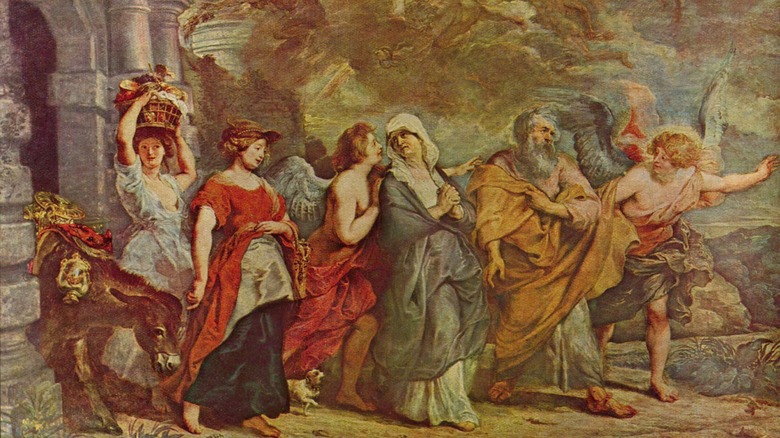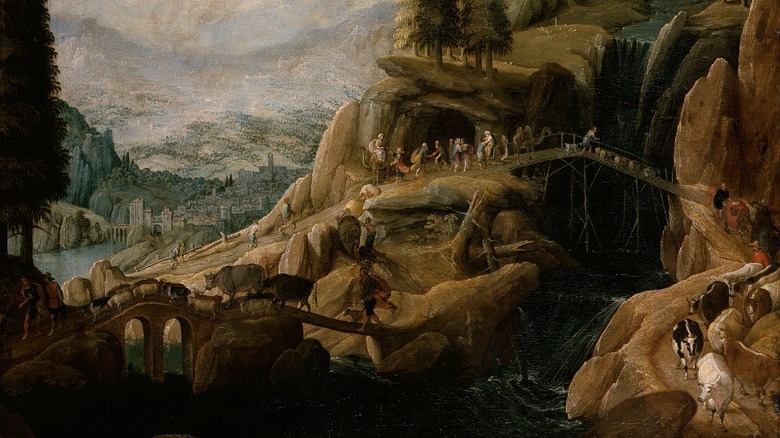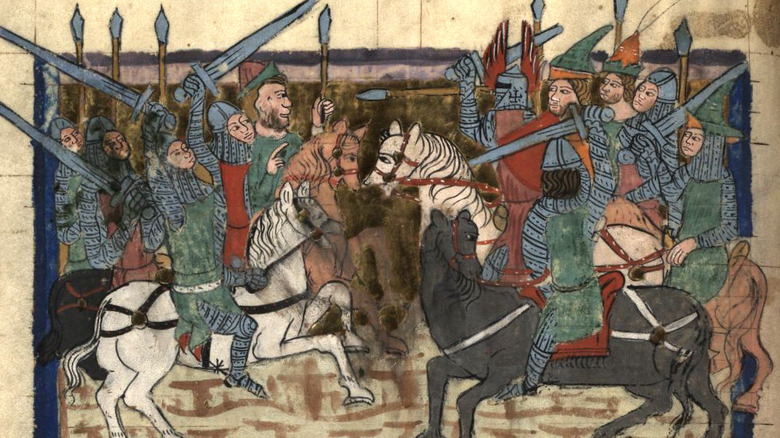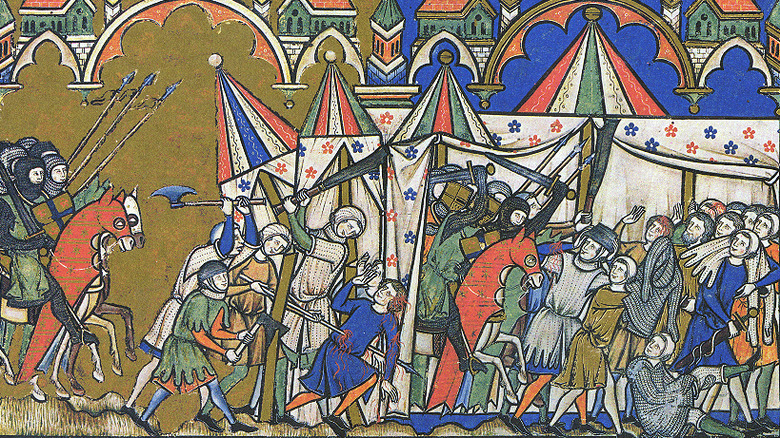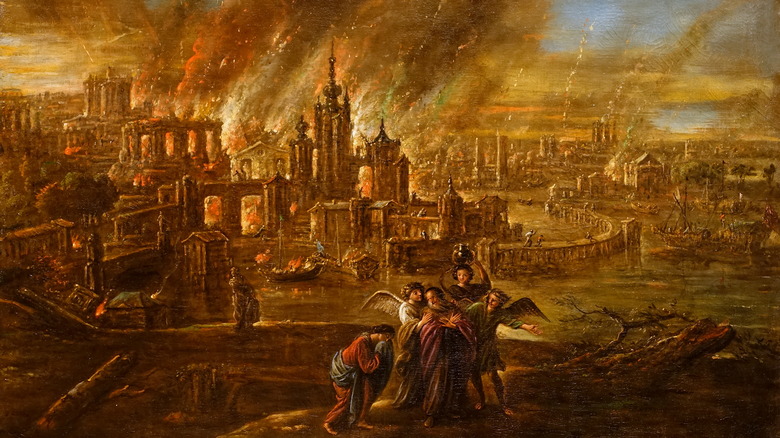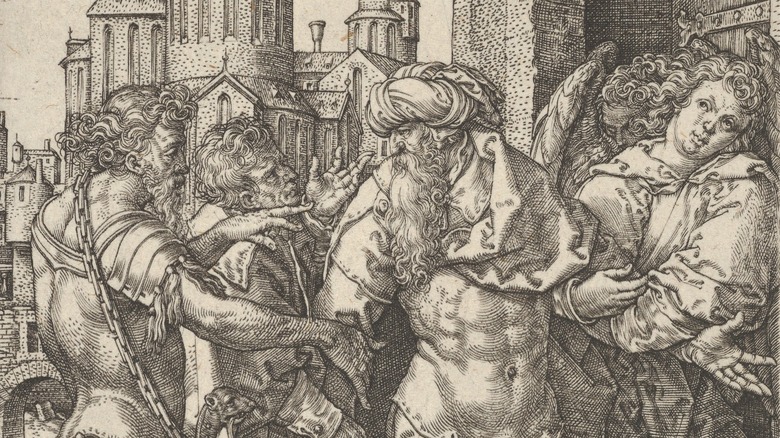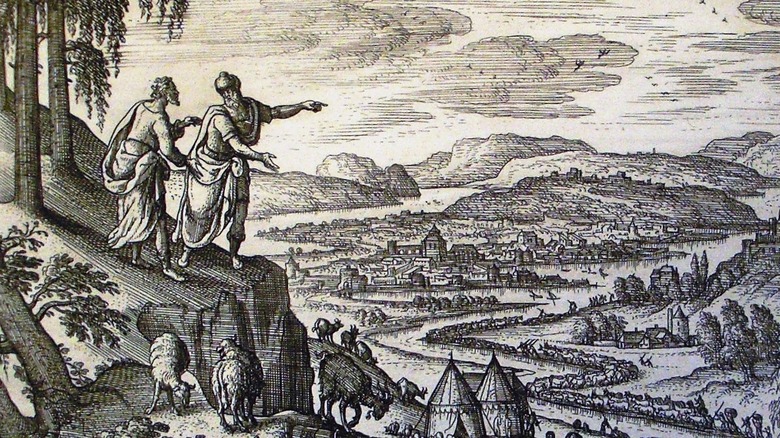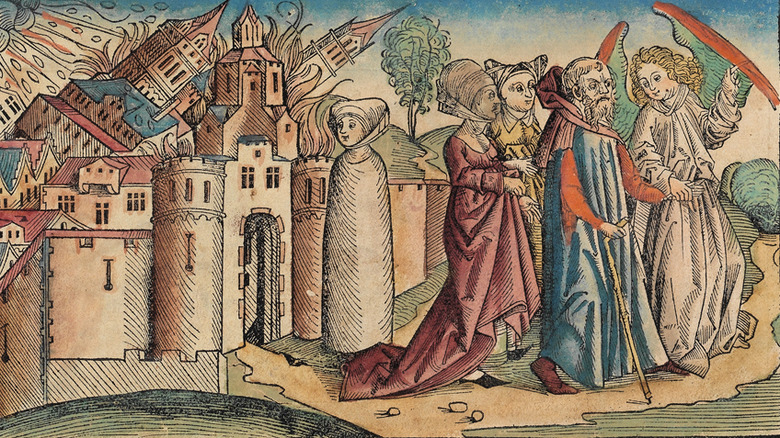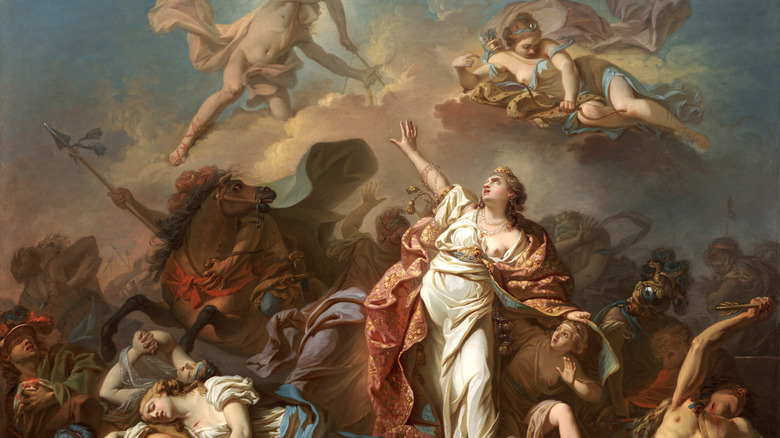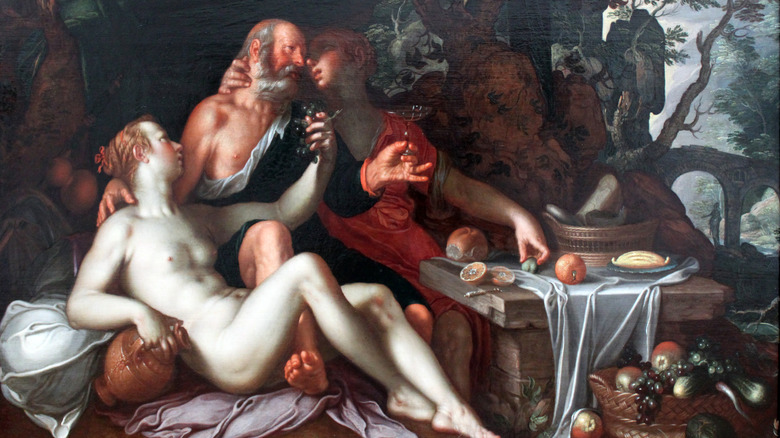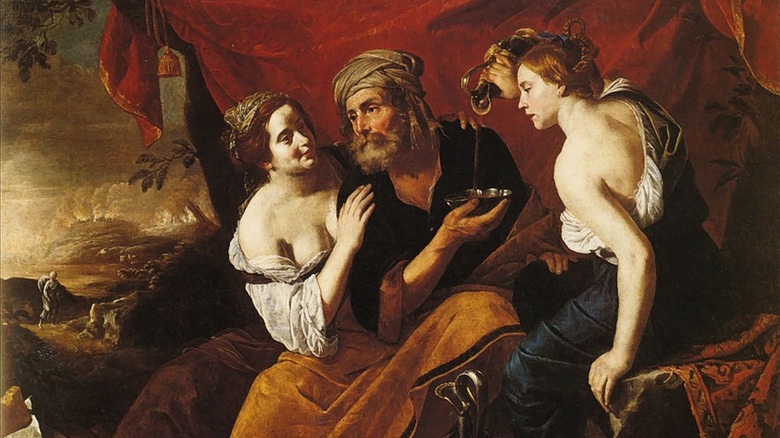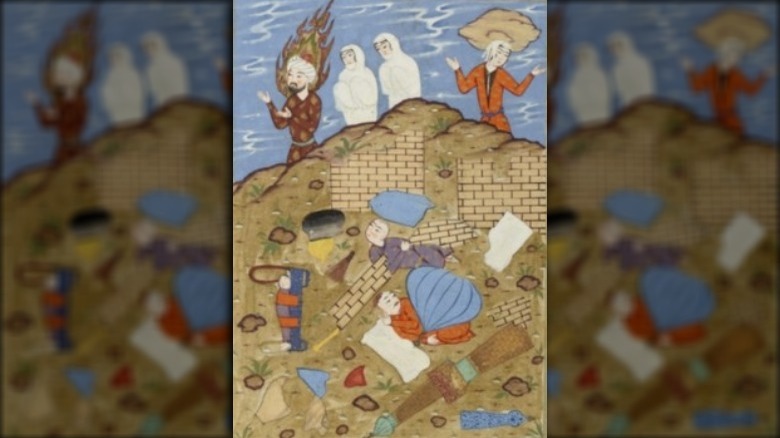The Untold Truth Of Lot From The Bible
The Book of Genesis, the first book of both the Jewish and Christian Bibles, is full of notable, colorful figures as it charts the history of God's relationship with humankind and the nascent nation of Israel starting from the literal beginning of time. These figures include a number of Sunday school favorites, including Adam and Eve, Noah, Abraham, Jacob and Esau, and Joseph. But there is a much larger number of figures who play more of a supporting role to these early heroes, including Abraham's nephew Lot, who serves in many ways as a foil and contrast to his uncle, the founding father of Judaism.
If all you know about Lot is that his wife turned to salt, or that he tried to make an indecent proposal to save the dignity of some angels, there's a lot more to him (pun intended). But was Lot a righteous man worthy of deliverance, or a morally challenged man deserving of all the horrible things that happened to him? Read on and decide for yourself.
Was Lot the nephew or brother of Abraham?
Lot is first mentioned in Genesis 11:27, where he is explained to be the son of Haran, the brother of Abram (later and better known as Abraham). The traditional and commonly accepted understanding is that Lot was Abraham's nephew. However, there are a few verses, including but not limited to Genesis 13:8, in which the two are called brothers. Nevertheless, despite the literal phrasing in a few instances of the two as brothers, the majority of commentators, including the Catholic Encyclopedia, understand "brothers" in this context to mean "relatives."
While the Bible itself gives relatively little background on Abraham's early family life, including his relationship with his brothers, Chabad.org explains that Jewish tradition tells the story of how Lot came to live with Abraham. When the king and mighty hunter Nimrod declared himself a god and demanded that the young Abraham bow before him, Abraham refused and was cast into a fiery furnace as a test of the power of his God. His brother, Haran, was unsure whose side to take, Nimrod's or Abraham's, and waited to see the results of Abraham's test before declaring loyalty. When Abraham emerged from the furnace without a singed hair, Haran declared himself for Abraham, which led him to being thrown in the furnace as well. Since his faith was not in God, he burned up, leaving the orphaned Lot to go live with Abraham.
Lot's employees were not to be trusted
As Got Questions explains, Abraham's father Terah took his family, including Lot, out of Babylon with the intent of settling in Canaan. While they ended up settling for a while in a place called Haran–yes, weirdly the same name as Lot's dad–after Terah's death, God told Abraham to take his family the rest of the way into Canaan. After a brief time together in Egypt due to a famine, Abraham and Lot end up settling on the hills of Bethel in Canaan, where they jointly raised their abundance of livestock. However, the herdsmen employed by Abraham and Lot began to fight amongst themselves because there wasn't enough land for both men's herds. Lot and his uncle subsequently agreed to split up, with Abraham giving him first pick for land. Lot ended up choosing his own doom by picking the beautiful plains by the Jordan River, next to the wicked city of Sodom.
According to Chabad.org, however, it wasn't merely Abraham and Lot's hired hands that had beef. Jewish tradition says that while Abraham's herdsmen kept their flocks in lands belonging to Abraham, Lot's men had no qualms about pasturing in land belonging to others. When Abraham's men rebuked Lot's for stealing, Lot's men chafed at the scolding, leading to uncle and nephew quarreling before deciding to split up for the sake of peace.
A scheming giant saved Lot's life
Even though Lot and Abraham split up physically following the feud over their pasturing lands, with Abraham remaining in Canaan and Lot moving to the city of Sodom, there were apparently no hard feelings between the two, as Abraham risked his life to rescue his nephew when Lot was taken as a prisoner of war. Genesis 14 records that five rulers in the Dead Sea region, including the kings of Sodom and Gomorrah, had refused for 13 years to pay tribute to Chedorlaomer, king of Elam in the north. Infuriated by this insult, Chedorlaomer, allied with three other northern kings who were faithful to him, marched to war against the insubordinate southern kings. The northern kings wiped out the five armies of the Dead Sea region and plundered their great cities, including Sodom, where Lot lived. As a wealthy citizen of that city, Lot was captured by the northern kings and–according to tradition–tortured because of his kinship to the kings' hated enemy, Abraham.
The Bible says that a survivor escaped to tell Abraham what had happened, but as Chabad.org explains, Jewish tradition says that this was no common survivor, but rather Og, the only giant to survive Noah's flood. Og hoped that when he told Abraham of Lot's imprisonment, the holy man would rush off to save him, where he would likely perish in battle so that Og could subsequently marry Abraham's wife, Sarah.
Abraham made magic weapons to save Lot
Despite the cruel giant Og's hopes that Abraham would die heroically in a foolish attempt to save Lot, God remained, as ever, faithful to his servant Abraham. As the Catholic Encyclopedia explains, the Book of Genesis doesn't give us a lot of detail surrounding Abraham's rescue mission. The canonical biblical record tells us that as soon as Abraham received word of Lot's predicament, he raised up an army of 318 of his best men and pursued the armies of the north. Under the cover of darkness, Abraham's men were able to surprise the northern forces and completely rout them, rescuing Lot and all of his household and possessions, leading them safely back to Sodom.
Fortunately, the rabbinic tradition absolutely lives for filling in details on accounts like this. As Chabad.org records, Abraham's forces were not even the full 318 men recorded in the Bible, as many of them were afraid to face Chedorlaomer's army despite the promised reward of gold and jewels. And so it was with only a tiny force of his most faithful friends that Abraham miraculously traveled a ten-day journey in one day in order to catch up with the northern king. Abraham threw dust and straw into the air, which God transformed into flying spears and arrows against his enemies, killing all but one of the northern kings and saving both Lot and a grateful king of Sodom.
Lot's daughter was murdered by bees
Probably the best-known story from the life of Lot is God's destruction of the cities of Sodom and Gomorrah. According to Genesis 18, a supernatural figure who was either God disguised in human form or the archangel Michael, depending on how you interpret the text, tells Abraham that "the outcry against Sodom and Gomorrah is immense, and their sin is extremely serious." The figure then says that he and the two men with him (angels in disguise) will visit Sodom to see if this outcry is justified, and if so, he will destroy the city. Abraham begs the Lord to spare Sodom if 50, then 40, 30, 20, or even 10 righteous people are found there. The Lord agrees and departs.
While the great sins of Sodom and Gomorrah are not specified in Genesis, Chabad.org tells us that their wickedness stemmed from the lives of wealth and luxury they led. The Talmud lists many examples of their cruelty, violence, and hatred of generosity. The specific crime that caused the Lord to come down to them was when Lot's daughter Plitith dared give bread to a starving old man. When the people of Sodom discovered her charity, they covered her in honey and stuck her to a wall, where she was eaten by bees. Her dying cries were the ones that pierced Heaven and caused God to pass judgment on Sodom and Gomorrah.
Angels had to stop Lot from selling out his daughters
As Got Questions explains, the Bible records that the two angels who had been accompanying God (or Michael) in his visit to Abraham–identified in tradition as the archangels Gabriel and Raphael–make their way to the city of Sodom where they are offered hospitality by Lot, the city's only righteous man. The amorality of Sodom is subsequently on display as the people of the city stand outside Lot's house and demand to have sex with the strangers (this is the element of the story that has led people to interpret the sin of Sodom as homosexuality). In one of the most "yikes"-inducing moves in the Bible, Lot tries to protect his guests by offering up his own daughters (the ones not eaten by bees) to the people of Sodom. Fortunately, it doesn't come to that, as the angels miraculously blind the people of the city so that Lot and his family can escape both the lascivious crowd and the imminent doom that Sodom has just definitely cemented for itself.
According to Louis Ginzberg's Legends of the Jews, the archangel Michael leads Lot, his daughters, and his wife out of the city to safety–his sinful sons-in-law refuse to believe destruction is coming–while Gabriel overturns the foundation stones of Sodom and Gomorrah with the power of his little finger before turning rainfall into a shower of burning brimstone, annihilating the cities.
Was Lot even that righteous?
Chabad.org suggests that Abraham's plea that the Lord spare Sodom and Gomorrah if even 10 righteous people could be found was not an arbitrary number. The 10 people Abraham is thought to have had in mind were Lot, his wife, their four daughters, and the daughters' husbands and fiancés. These sons-in-law, however, natives of Sodom, were just as wicked as the rest of the people of the city and would not have counted toward salvation anyway.
But this raises the question, just how righteous was Lot anyway? He is thought to have been spared due to his virtue, but as Got Questions points out, he and his family were firmly entrenched in the wicked and materialistic life of Sodom, and Lot was very quick to offer up his virgin daughters to the slavering mob. The Jewish Encyclopedia says that Lot is generally interpreted in an unfavorable manner. He was greedy and primarily concerned for his own wealth, allowing his herdsmen to pasture in others' lands, and his hesitation to leave Sodom before its destruction shows his attachment to material things. As such, most rabbis believed that any favors shown to Lot by God were in deference to his connection to Abraham, and in fact, Lot would have been destroyed along with Sodom were it not for his faithfulness to Abraham during their time in Egypt.
Why salt?
In the popular consciousness, Lot is probably overshadowed by his wife, who never even gets a name in the biblical account. As the Jewish Encyclopedia explains, during Lot's family's evacuation of the city of Sodom, his wife looks back at the destruction and is changed into a pillar of salt. The Encyclopedia goes on to suggest that this element of the story likely has a folkloric origin, intended to explain a specific column of crystallized rock salt that resembled a human woman, such as the one referenced by the Jewish writer Josephus in his work "Antiquities."
But if the story isn't just a folktale, some questions remain. Why wasn't Lot's wife allowed to look back, and why salt specifically? The Jewish Women's Archive explains that Lot's wife, given the name Idit by rabbinical tradition, had been the one that alerted the people of Sodom to the presence of Lot's angelic guests when she went to her neighbors to borrow salt. Having sinned through salt, she became salt. Furthermore, tradition explains that the reason Idit turned back was out of pity for her sons-in-law who remained in the city. When she turns around, she witnesses the unbridled power of the presence of God, which the human body is not built to withstand, and is thus transformed. Alternatively, her hesitation may have caused her to be swept up in the destruction of the city rather than being punished specifically for disobedience.
The Greek version of Lot's wife
Greek mythology has a story that is often likened to that of Lot's wife, not so much in its setup as its results. As the Encyclopedia Britannica explains, Niobe is the wife of the king of Thebes and is blessed (or cursed, depending on your point of view) with six (sometimes seven) sons and six (sometimes seven) daughters. Her pride in her children causes her to brag about having more children than Leto, the Titaness mother of the gods Apollo and Artemis. Now, if you've ever read Greco-Roman mythology, you know there are two things you never do: 1) do not approach any animal that might be Zeus in disguise and 2) never brag that you're better than a god. In response to Niobe's thoughtless boasting, Leto sends her twin children to rain down deadly arrows upon the 12 children of Niobe, Apollo killing the boys and Artemis killing the girls.
None of this is similar to the tale of Lot's wife yet, but this next part is. Niobe is, naturally, overwhelmed with grief. She is unable to stop weeping at the loss of her beautiful children due to her own imprudence. Overcome with sadness, she leaves Thebes and returns to her native home in Turkey, where the gods have pity on her and turn her into a stone. This stone is identified with a real rock northeast of Izmir that is said to "weep" when the mountain snows melt.
The disturbing fate of Lot and his daughters
The horrible consequences for Lot don't end just because he and his daughters escaped the destruction of Sodom and Gomorrah. As Bible Odyssey explains, Lot and his daughters fled to the nearby town of Zoar during the brimstoning of Sodom, but Lot, fearing for his life in this city as well, foolishly leaves Zoar to go live in the mountains even though the angels assured him that Zoar would be preserved as a safe haven for his family. Now living in a tiny mountain cave after having witnessed the supernatural destruction of their home, Lot's two daughters somewhat reasonably conclude that they must be the last surviving people on Earth. Somewhat less reasonably, however, they conclude that it is their job to repopulate the Earth using the seed of the only man they believe left alive: their father. The daughters get Lot drunk and sleep with him on two consecutive nights. Each daughter conceived and gave birth to a son, one named Moab ("From my father") and one named Ben-Ammi ("Son of my people").
Most scholars agree that this story is meant as an explanation for the origin of the Moabites and Ammonites, two nations that border Israel and with whom they were often at loggerheads. It makes sense then that the author of Genesis 19 would want to give their enemies a less than glorious origin.
Without Lot's gross sin, there is no Jesus
Even though the story of Lot and his daughters is one of the most horrible events in the Bible (a high bar to clear, to be honest), arguably something good came out of it. As Chabad.org points out, this is the last we hear of Lot in the Bible. We never even get a record of his death, which only even gets the most passing of mentions in Jewish legend. However, it's not the last we hear of his line of descendants. The Moabites and Ammonites continue to appear as antagonists to the Israelites throughout the rest of the Torah, but there is one Moabite in particular who is particularly notable: Ruth, a Moabite woman who has a whole book of the Bible named after her. She marries an Israelite named Boaz, and their descendants include Israel's King David, who, besides being arguably the greatest ever Jewish king, is also the forefather of the Moshiach, a.k.a. the Messiah.
For Christians, of course, the Messiah is Jesus. The genealogy of Jesus in Matthew chapter 1 includes Boaz and Ruth the Moabite. Therefore, as weird as it is to say, without the super gross sins of Lot and his daughters, Jesus would never have been born. Maybe it's for this reason that the Christian author of 2 Peter named Lot as an example of a righteous man.
The Islamic view of Lot
Lot is not only a figure in the Jewish and Christian Bibles, but also features relatively prominently in the Quran. As My Islam explains, Lut (the Arabic version of the name Lot) is considered a prophet is Islam, in the line of Noah and his uncle Ibrahim. As opposed to the only questionably righteous figure of Lot from the Torah, the Lut of the Quran is a very holy man who is held in high esteem by God. Indeed, the reason that Lut ends up in Sodom in the first place is that he was the hand-picked messenger of Allah to deliver the message of Islam to the people of Sodom. A notable difference in the account of the Quran is that here the people of Sodom were not only practitioners of homosexuality, but indeed the inventors of it. In this tradition this is unquestionably the sin of Sodom, rather than their violence, decadence, and poor hospitality in Genesis.
The story of the angels progresses much as in Genesis, and the destruction of Sodom is brought down when the angels send down a shower of hard clay rocks, each one inscribed with the name of a sinner of Sodom. Lut's wife, who never converted to Islam, is crushed by these rocks rather than becoming salt, and Lut and his daughters flee the city and definitely don't do the gross part from Genesis.
